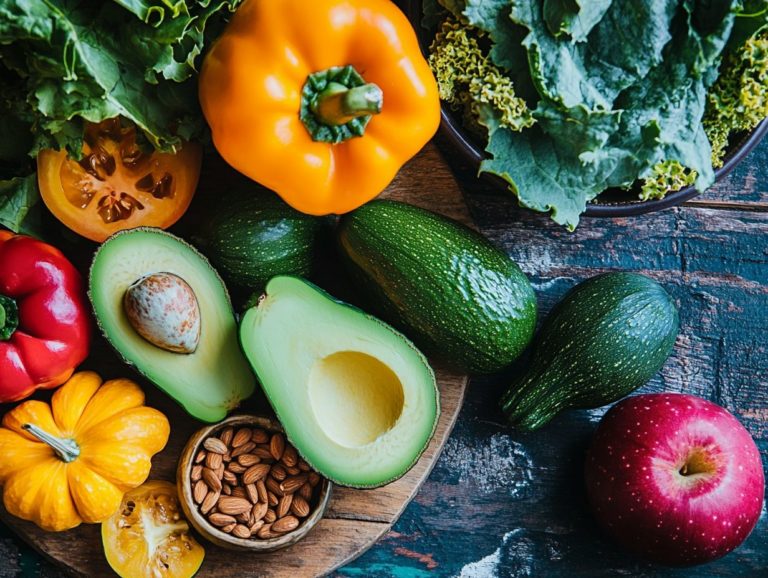Keto Diet and Personalization: Common FAQs
Curious about the keto diet or ketogenic diet? This guide covers everything about the keto diet, including its principles, benefits, and potential risks associated with this popular eating style.
You will also learn how to tailor your approach for maximum effectiveness, ensuring it aligns seamlessly with your unique lifestyle and health goals, especially if you manage conditions like diabetes or insulin resistance.
Whether you’re just starting out or aiming to refine your keto journey, you’ll find valuable insights, including keto-safe foods and dietary choices that will empower you to succeed.
Contents
- Key Takeaways:
- What Is the Keto Diet?
- How Does the Keto Diet Work?
- Unlock the Benefits of the Keto Diet!
- What Are the Potential Risks of the Keto Diet?
- How Can the Keto Diet Be Personalized?
- Health Goals
- Lifestyle Factors
- Is the Keto Diet Safe for Everyone?
- How to Get Started with the Keto Diet?
- Frequently Asked Questions
- What is a Keto Diet and how can it be personalized?
- What are the benefits of personalizing a Keto Diet?
- Can everyone follow a Keto Diet, including during Pregnancy?
- How do I know if I am in ketosis?
- Is it safe to follow a Keto Diet long-term, considering Carbohydrates and Protein Needs?
- Can I personalize a Keto Diet if I have dietary restrictions?
Key Takeaways:
- The keto diet is a low-carb, high-fat diet that aims to put the body in a state called ketosis, where it burns fat for fuel instead of carbs.
- Personalization is key to success on the keto diet, allowing for individualized macronutrient ratios, food preferences, health goals, and lifestyle factors.
- While the keto diet can have numerous benefits, it may not be suitable for everyone, especially pregnant or nursing women, those with certain medical conditions like high cholesterol, and children and teens.
What Is the Keto Diet?
The keto diet, or ketogenic diet, is a low-carb, high-fat approach crafted to induce ketosis. In this process, your body becomes a highly efficient fat-burning machine, utilizing fat for energy rather than carbohydrates.
As the quest for effective weight loss solutions continues, the keto diet has quickly become a favorite among those looking to enhance their health and manage weight. By dramatically reducing carbohydrate intake and replacing it with healthy fats, the keto diet encourages your body to transition its primary energy source from glucose to ketones, ultimately fostering improved metabolic functions.
How Does the Keto Diet Work?
The keto diet operates by significantly cutting back on carbohydrate intake. This leads to lowered insulin levels and prompts your body to enter a metabolic state called ketosis. In ketosis, fat becomes your primary source of fuel instead of carbohydrates.
Your liver takes fatty acids and converts them into ketones, providing energy for your body and brain. This transition provides a steady energy supply while ramping up fat burning.
Not only does this process assist in weight management, but it may also enhance insulin sensitivity and promote overall metabolic health.
What Are the Different Types of Keto Diet?
You’ll find several variations of the keto diet, each crafted to cater to different dietary preferences and health objectives. Whether you’re leaning toward the standard keto diet, cyclical keto, targeted keto, or even a keto vegetarian option, there’s something here for everyone.
The standard keto diet focuses on a strict low-carb, high-fat ratio to kickstart nutritional ketosis, while other variations offer a bit more flexibility. For instance, cyclical keto incorporates higher carb days to replenish glycogen stores, allowing for some balance in your intake.
If you’re considering a plant-based approach, the keto vegetarian option emphasizes protein and healthy fats from plant sources, making it perfect for those who want to follow keto without animal products. Each variation serves a unique purpose; targeted keto, for example, is particularly suited for athletes, enabling them to consume extra carbohydrates around their workouts to maintain energy levels.
By adjusting the macronutrient ratios, these different keto approaches support individuals with specific fitness routines or dietary restrictions. High-fat foods play an essential role across all keto diets, serving as the primary energy source while also promoting satiety, which can significantly enhance adherence to the diet.
Understanding these nuances enables you to select a keto approach that aligns seamlessly with your lifestyle and health aspirations.
Unlock the Benefits of the Keto Diet!
The keto diet offers a world of benefits that can transform your health and well-being. It is a compelling choice for anyone looking to elevate their lifestyle.
1. Weight Loss
Weight loss is one of the most celebrated benefits of the keto diet. This diet effectively ushers your body into a state of ketosis.
In this metabolic state, your body turns to fat as its primary fuel source rather than carbohydrates. This transition ramps up fat burning and helps suppress your appetite, enabling you to consume fewer calories without feeling deprived.
As you reduce your carbohydrate intake, your insulin levels drop, enhancing your body’s ability to tap into stored fat for energy. Understanding the mechanisms behind this process will allow you to fully harness the potential of the keto approach.
When you commit to a low-carb, high-fat diet, your liver produces substances called ketones from fat stores. These substances provide an alternative energy source for your brain and body, promoting a more efficient fat-burning state.
This shift stabilizes your energy levels and curbs cravings for sugar and carbs. To maximize these benefits, it’s essential to incorporate healthy fats, stay hydrated, and monitor your protein intake.
By following these practical tips, you can support your weight loss goals and enhance your overall well-being.
2. Improved Blood Sugar Control
The keto diet shows remarkable potential in enhancing blood sugar control. This makes it especially beneficial for those with diabetes or insulin resistance.
By significantly cutting back on carbohydrates, this diet lowers blood glucose levels and stabilizes your insulin response. Many individuals on a low-carb diet report fewer fluctuations in blood sugar and a decreased dependence on medications.
This shift occurs because your body transitions from relying on glucose for energy to utilizing fat, thereby reducing the demand for insulin. Consequently, your insulin sensitivity may improve, allowing your body to manage blood sugar levels more effectively.
This dietary approach also helps reduce inflammation and promotes weight loss, both crucial for managing diabetes. With stable blood glucose levels, you’ll likely notice enhanced energy and fewer hunger pangs, further supporting your healthy lifestyle choices.
By fostering better blood glucose regulation, the keto diet provides a strategic pathway to manage diabetes more effectively.
3. Increased Energy Levels
Many individuals on the keto diet experience a noticeable increase in energy levels. This vibrant boost is attributed to the body’s transition into ketosis and its reliance on fat as a primary fuel source.
Once you become fully fat-adapted, your body efficiently taps into stored fat and dietary fats for energy. This efficiency enhances your stamina and reduces fatigue during physical activities. You will enjoy a steady supply of fuel that minimizes the energy crashes often seen with high-carb diets.
As ketosis sets in, you’ll notice improved energy levels, a more stable mood, and heightened mental clarity. This can significantly enrich your overall well-being.
With a consistent supply of ketones, your brain receives an optimal energy source, contributing to sharper focus and enhanced cognitive performance. This is particularly beneficial if you’re engaging in demanding workouts or tackling mentally taxing tasks, as sustained energy translates into better endurance and productivity.
Ultimately, the sustained energy benefits of the keto diet elevate your physical performance and cultivate a sense of vitality and health that many people aspire to achieve.
Ready to experience these transformative benefits? Start your keto journey today and unlock a healthier you!
4. Reduced Inflammation
One of the standout benefits of the keto diet is its ability to reduce inflammation. This is a result of transitioning into nutritional ketosis and embracing anti-inflammatory foods. Many who adopt this lifestyle notice a significant decrease in inflammation-related symptoms. This leads to an overall enhancement in health and well-being. This reduction in inflammation can also facilitate quicker recovery times and improve performance for those engaged in physical activities.
Research indicates that entering a state of ketosis may help modulate immune responses. This potentially reduces chronic inflammation associated with various health conditions. By prioritizing healthy fats like avocados, nuts, and olive oil, while also incorporating low-carb vegetables, you maintain your energy levels and ingest a wealth of antioxidants.
Studies have shown that these thoughtful dietary choices can result in lower levels of inflammatory markers, such as C-reactive protein (CRP). Anecdotal evidence from active individuals following the keto diet often reveals improvements in joint pain and muscle soreness. This highlights its attractive potential for athletes aiming to optimize performance while keeping inflammation at bay. Entering a state of nutritional ketosis can also enhance these benefits.
What Are the Potential Risks of the Keto Diet?
While the keto diet presents many enticing benefits, it’s vital to consider the potential risks before embarking on this journey. Individuals with diabetes should be cautious due to the risk of diabetic ketosis.
One primary concern is the likelihood of nutrient deficiencies. The restriction of specific food groups can lead to a lack of essential vitamins and minerals.
You might also encounter what is commonly referred to as the ‘keto flu’. This includes a range of symptoms, such as fatigue and irritability, that can accompany your initial transition into ketosis.
Some people might experience higher cholesterol levels. Another potential issue could be the development of keto breath, an often temporary but distinct odor caused by ketosis.
1. Nutrient Deficiencies
One of the notable risks of the keto diet is the potential for a lack of important nutrients. This issue arises from dramatically cutting back on carbohydrate-rich foods that typically provide essential vitamins and minerals. As you eliminate various high-carb sources, such as fruits, whole grains, and certain vegetables, you might inadvertently restrict your intake of crucial nutrients.
This could lead to deficiencies in vital vitamins, like vitamin C, and minerals such as potassium and magnesium. Both are essential for your overall health.
To counter these risks, it’s important to incorporate a diverse array of low-carb vegetables, nuts, and seeds into your meals. For instance, leafy greens, avocados, and cruciferous vegetables can provide a wealth of vitamins and minerals without compromising your state of ketosis.
Adding quality sources of fats, like olive oil and fatty fish, can also enhance nutrient absorption. Regularly monitoring your nutrient levels through blood tests and supplementing with essential vitamins like B vitamins, magnesium, and omega-3 fatty acids if necessary, supports your health while maintaining a strict ketogenic regimen.
It’s also important to keep an eye on your ketone levels to ensure you remain in a state of ketosis. Stay informed and monitor your health closely while on the keto diet!
2. Keto Flu
Keto flu refers to the flu-like symptoms you might experience during the initial phase of the keto diet as your body adapts to burning fat for fuel instead of carbohydrates. You may encounter fatigue, headaches, irritability, and dizziness within the first week of entering ketosis. While these symptoms can be quite uncomfortable, rest assured they are usually temporary.
You can ease them through proper hydration, ensuring adequate dietary salt intake, and transitioning into the diet gradually. During this adaptation phase, you might also face muscle cramps, sleep disturbances, and cognitive fog, which are linked to shifts in electrolyte balance—minerals that help regulate various bodily functions—and the depletion of glycogen stores.
Your body undergoes changes as it uses fat instead of carbohydrates. This is why prioritizing hydration is essential. Consider incorporating bone broth or electrolyte supplements to support your body through this transition. Ensuring you get enough sodium, potassium, and magnesium can help restore balance and alleviate those uncomfortable sensations.
Managing your carb intake during this phase is also crucial to maintaining balance. By being mindful of your food choices and staying well-hydrated, you can make this transition smoother and pave the way for successfully embracing the benefits of a ketogenic lifestyle.
3. Digestive Issues
Digestive issues can arise when you embark on the keto diet, primarily due to the reduced intake of dietary fiber from fruits and whole grains, which are often limited. This can lead to constipation or other gastrointestinal discomforts, particularly if you’re not careful about managing your fiber intake through low-carb vegetables and supplements.
It’s essential to pay attention to your digestive health and integrate adequate fiber sources into your meals. Be sure to include foods like leafy greens, avocados, and chia seeds. These options provide essential nutrients without overwhelming your system with carbohydrates.
Hydration is also key. Drinking enough water not only aids digestion but also helps prevent constipation. You could also include keto-safe fiber supplements to maintain digestive health. Incorporate probiotics, whether through fermented foods or targeted supplements, to significantly bolster your gut health by supporting a balanced microbiome.
Ultimately, by making thoughtful dietary choices, you can effectively mitigate potential digestive difficulties on the keto diet, ensuring a more comfortable and sustainable experience as you navigate this low carb lifestyle.
4. Increased Risk of Heart Disease
Some research indicates that the keto diet might elevate your risk of heart disease due to its high-fat content, particularly saturated fat, which can lead to increased cholesterol levels in certain individuals. While your body becomes accustomed to using fat for energy, it’s vital to focus on the quality of the fats you consume, as unhealthy fats can heighten your risk of heart disease.
Monitoring your cholesterol levels and making knowledgeable dietary choices can help mitigate these potential risks. Heart health should be a top priority if you’re considering a ketogenic lifestyle. By emphasizing the consumption of healthy fats—think avocados, nuts, and olive oil—you can reap essential nutrients while minimizing significant risks to your cardiovascular health.
Be mindful of high cholesterol levels, which can be an issue for some individuals on a high-fat diet. Incorporating fatty fish that are rich in omega-3s may also support balanced cholesterol levels and reduce inflammation.
Regular check-ups with your healthcare provider and candid discussions about your heart health can ensure that your approach to the keto diet is both effective for weight loss and protective against heart disease. Staying informed and mindful about your food choices is essential for maintaining your long-term cardiovascular well-being.
How Can the Keto Diet Be Personalized?
Personalizing the keto diet significantly boosts its effectiveness, as your nutritional needs and preferences are unique to you. By fine-tuning your nutritional ratios, choosing foods that resonate with your tastes, and factoring in your specific health goals, you can craft a sustainable keto eating plan that aligns perfectly with your lifestyle. Understanding your carbohydrate, protein, and fat requirements will help you manage your diet effectively.
It’s essential to consider elements like your activity level, age, and any existing health conditions to tailor the diet for optimal results and long-term adherence.
1. Individual Nutritional Ratios
Determining your individual nutritional ratios is essential for personalizing the keto diet, ensuring you achieve the perfect balance of fats, proteins, and carbohydrates to successfully enter and maintain ketosis. Typically, a standard ketogenic diet comprises around 70-75% fat, 20-25% protein, and 5-10% carbohydrates. However, these ratios can and should be tailored to align with your specific goals, whether that’s weight loss, muscle building, or managing insulin resistance.
Calculating your macros is your key to unlocking the full potential of your keto journey! To start, you’ll first need to establish your daily caloric needs. This can be easily accomplished with online calculators that take into account factors like age, weight, height, and activity level. Once you’ve pinpointed your total caloric intake, you can break down your macronutrients by applying the corresponding percentages for each category.
For instance, if your goal is muscle building, you might consider increasing your protein intake to around 30%, which would require a slight reduction in fat to balance it out. Those undergoing pregnancy should tailor their macros under medical supervision.
Utilizing tools like macro calculators and smartphone apps can be incredibly beneficial in this process, allowing you to adjust your inputs effortlessly and track your intake with precision. Ultimately, finding the right macronutrient distribution isn’t just about numbers; it’s about achieving a balance that supports your health goals while keeping your meals enjoyable and satisfying.
2. Food Preferences
Incorporating your food preferences into the keto diet is crucial for maintaining long-term adherence and genuinely enjoying this lifestyle. Whether you lean towards a classic high-fat diet filled with meats and cheeses or prefer a keto vegetarian approach focusing on plant-based fats and proteins, aligning your food choices with your personal tastes can significantly enhance your experience.
This flexibility invites you to explore a diverse array of keto foods and keto drinks while effortlessly achieving your nutritional goals. For example, if you’re a fan of Mediterranean flavors, indulge in a delightful salad featuring avocado, olives, and feta cheese, all while meeting your dietary needs.
If you have a sweet tooth, experiment with keto-friendly desserts made with almond flour and erythritol. This way, you can satisfy those cravings without veering off course. Discover thrilling new recipes today that will make your keto meals a delicious adventure!
By customizing your food choices to reflect your personal preferences, you can uncover new and exciting recipes that make your meals varied and interesting, ultimately strengthening your dedication to the keto lifestyle.
Health Goals
Setting clear health goals is essential for personalizing your keto diet. This enables you to tailor your dietary approach to the specific outcomes you wish to achieve. Whether your aim is weight loss, muscle building, or enhancing your metabolic health through diabetic ketosis, having a solid understanding of your objectives helps you determine the ideal macronutrient ratios—the balance of carbohydrates, proteins, and fats in your diet—and food choices that will support your aspirations. This targeted approach ensures that your diet stays in harmony with your personal health ambitions.
For example, if you’re focusing on weight loss, you might prioritize a higher fat intake while dramatically reducing carbohydrates to encourage fat burning. Conversely, if muscle gain is your goal, increasing your protein intake can support muscle synthesis, all while staying true to the core principles of the ketogenic framework.
Recognizing your goals helps you create a customized meal plan that not only meets your nutritional needs but also fosters motivation and sustainability. Ultimately, embracing a clear focus on your health objectives elevates the effectiveness of your dietary journey, making it not just more rewarding but also entirely achievable.
Lifestyle Factors
Lifestyle factors significantly influence how you can personalize the keto diet, shaping your dietary choices and meal planning. Elements such as your activity level, work schedule, and social commitments play a crucial role in how you approach your diet, making it essential to tailor the keto plan to fit your unique circumstances.
By understanding these factors, you can maintain consistency and make informed food choices that harmonize with your overall lifestyle.
For example, if you’re a busy professional, sticking to traditional meal prep might feel like a challenge amidst your hectic work hours. In such cases, crafting quick, keto-friendly meals that can be prepared in advance or opting for convenient options like grocery delivery can simplify your routine.
When dining out, being aware of the menu options and making strategic choices, such as requesting substitutions or favoring high-fat proteins, allows for a more sustainable approach.
Navigating social gatherings can present its own challenges, but bringing a keto dish to share can ease the pressure and ensure you stay on track, all while inviting others to explore low-carb options alongside you.
Is the Keto Diet Safe for Everyone?
The safety of the keto diet can differ greatly from one person to another, as individual health risks and medical conditions play a significant role in determining its suitability. While many individuals may thrive on the keto diet, recognizing this is crucial for your health journey. Those with specific conditions—such as high cholesterol, diabetes, or those who are pregnant—should seek guidance from a healthcare professional before embarking on any major dietary shifts.
Understanding your unique health circumstances is vital for ensuring that the keto diet aligns with your personal safety and health requirements.
Pregnant or Nursing Women
Pregnant or nursing women should approach the keto diet with a healthy dose of caution, as their nutritional needs are significantly heightened during these crucial phases. While some may find success with low-carb diets, it’s vital to ensure that they are meeting the increased requirements for vitamins and minerals essential for fetal development and breastfeeding. Seeking professional guidance is highly advisable to tailor your dietary choices in a way that supports both your health and your baby’s needs.
Beyond just macronutrient ratios, it’s equally important to focus on the quality of fats consumed. Healthy sources of fat can have a positive impact on both maternal and infant health. Keep properly hydrated to avoid digestive issues and maintain a balanced intake of fiber-rich foods. You’ll want to be vigilant about monitoring any potential side effects, such as fatigue or nutritional deficiencies, that could affect your wellbeing.
Consulting with a healthcare provider or a registered dietitian is an essential step in ensuring that your dietary approach aligns with safe practices tailored for pregnancy and breastfeeding.
2. People with Certain Medical Conditions
If you have certain medical conditions, it’s wise to approach the keto diet with caution. This diet may not be the ideal fit for everyone. If you struggle with diabetes, high cholesterol, or kidney issues, you could encounter specific challenges or health risks when embracing a low-carb, high-fat lifestyle.
That’s why it’s essential for you to consult with a healthcare professional. They can assess the potential benefits and risks of the keto diet based on your unique medical history.
Tailored dietary approaches consider the complexities of your health status. This ensures that any restrictions or modifications align with your specific needs. For instance, your healthcare provider might suggest adjustments to your nutrient intake or propose alternative dietary plans that offer similar benefits without the risks associated with the keto diet.
Prioritizing these individualized strategies is crucial, as they can help mitigate potential complications and promote your overall well-being. This way, you can pave the path for a healthier lifestyle without jeopardizing your health.
3. Children and Teens
Nutritional Needs
The keto diet can present unique challenges for children and teens. They have different nutritional needs than adults. Some may find a ketogenic approach beneficial for managing medical conditions like epilepsy. However, it is crucial to ensure they receive the nutrients essential for their growth and development.
You must engage in careful planning and seek professional guidance. This ensures they receive the nutrients essential for their growth and development.
Consider the amount of food they eat: it needs to be sufficient to fuel their active lifestyles and support ongoing growth. Skipping out on carbohydrates can mean missing out on vital nutrients found in fruits, vegetables, and whole grains, which could lead to deficiencies. Therefore, it’s important for you, as a caregiver or healthcare provider, to customize the diet. Incorporate healthy fats and proteins while ensuring a diverse array of vitamins and minerals.
Regularly checking in with a registered dietitian ensures a safer keto diet experience. This also facilitates adjustments as your child’s needs evolve over time.
4. Athletes
As an athlete contemplating the keto diet, it’s essential to consider how this approach may influence your performance and energy levels. This is especially true during high-intensity workouts that typically depend on carbohydrates for quick energy bursts. While some athletes thrive on a ketogenic lifestyle, others may find their performance waning due to insufficient glycogen stores.
You must evaluate your training needs to ensure peak performance! It’s crucial to assess your specific training needs and tailor your dietary choices accordingly.
The secret to successfully embracing the keto diet lies in grasping the body’s transition from using carbohydrates to relying on fat as its primary fuel source. This metabolic shift can yield significant adaptations over time. However, be prepared for some initial fatigue and decreased stamina as your body adjusts.
Maintaining optimal hydration and electrolyte balance while following a low-carb plan is vital. These factors directly impact your endurance and recovery. By diligently monitoring your energy levels and fine-tuning your macronutrient intake, you can craft a balanced diet that enhances your training outcomes and meets your unique performance demands.
How to Get Started with the Keto Diet?
Embarking on the keto diet requires a thoughtful approach to ensure a seamless transition into this low-carb, high-fat lifestyle. Your first step should be consulting with a healthcare professional. They can evaluate your individual health needs and help you establish a safe and effective dietary plan.
Once that’s in place, meal planning takes center stage. This is where you’ll curate a selection of keto-friendly foods that not only meet your macronutrient goals but also keep your meals varied and enjoyable.
1. Consult with a Healthcare Professional
Consulting with a healthcare professional is a crucial first step for anyone considering the keto diet, as it allows you to receive a comprehensive health assessment and tailored dietary recommendations. This consultation can help uncover any underlying medical conditions or dietary restrictions that might influence the safety and effectiveness of adopting a low-carb, high-fat lifestyle. By collaborating with a professional, you can ensure that your dietary choices are in line with your unique health needs.
A healthcare expert can provide invaluable insights into potential health risks associated with the keto diet, such as nutrient deficiencies, increased cholesterol levels, or impacts on kidney function. They often suggest necessary lab tests to evaluate your current health status and metabolic readiness for such a significant dietary change. This personalized guidance not only helps mitigate risks but also enables you to make informed decisions, especially if you have diabetes or are concerned about insulin resistance.
Therefore, embarking on this journey with professional support can significantly enhance your chances of achieving weight loss goals while promoting your overall well-being and managing high cholesterol and other health risks.
2. Plan Meals and Snacks with Keto Foods and Keto Drinks
Meal planning is essential for successfully sticking to the keto diet, allowing you to structure your eating habits around keto-friendly foods while steering clear of those tempting high-carb options. By preparing your meals and snacks in advance, you can ensure you remain on track with your dietary goals, making it easier to handle social situations and cravings that may come your way. This proactive approach assists you in maintaining a well-balanced intake of fats, proteins, and low-carb vegetables and avoiding excessive carb intake.
To launch a successful meal planning routine, consider creating a weekly menu that showcases a variety of keto-friendly ingredients like avocados, spinach, and grass-fed meats. Incorporating simple snacks, such as cheese crisps or almond butter, can help you fend off hunger between meals. Utilizing tools like meal prep containers can also support portion control, ensuring that every serving aligns with keto guidelines, especially for a low-carb diet.
And don’t forget to embrace seasonal produce; it not only boosts the flavor of your dishes but also keeps your meal planning process fresh and enjoyable. Including fruits, vegetables, and other keto-friendly foods can make your diet more varied and satisfying.
3. Stock Up on Keto-Friendly Foods
Stocking up on keto-friendly foods is crucial for anyone embarking on the keto diet, as it equips you with the essential ingredients needed to thrive on a low-carb, high-fat eating plan. By focusing your grocery shopping on staples such as healthy fats, high-quality proteins, and low-carb vegetables, you lay a solid foundation for successful meal preparation and adherence to your dietary goals. When your pantry is well-stocked, you significantly reduce the temptation to reach for non-keto options when hunger strikes, making it easier to maintain nutritional ketosis.
As you prepare for your shopping trip, prioritize quality ingredients. This means selecting grass-fed meats, organic vegetables, and clean fats like avocado oil or coconut oil. Pay close attention to labels, ensuring you choose those low-carb options that are free from added sugars or unhealthy fillers. Consider also keto safe options like keto drinks and snacks that fit your dietary plan.
For a balanced approach, consider adding the following to your cart:
- Avocados
- Leafy greens
- Eggs
- Full-fat dairy
- Nuts
- Butter
- Fish
- Milk
- Yogurt
- Olive oil
Exploring local farmers’ markets is another excellent way to find fresh produce while supporting sustainable farming practices. This not only ensures a healthy start on your dietary journey but also keeps your meals exciting and varied, particularly if you follow a keto vegetarian lifestyle.
4. Track Progress and Make Adjustments
Tracking your progress on the keto diet is essential for grasping just how well your dietary changes are paying off. It also helps in finding areas that might need a little fine-tuning. By keeping an eye on your ketone levels, body weight, and overall health metrics, you can determine whether you’re hitting your health goals and make any necessary adjustments to your eating habits along the way. Regularly checking your progress is vital. It keeps you on track for success on your ketogenic journey. Monitoring factors like insulin and carb intake also provides insights into your progress.
Utilizing tools like blood ketone meters, urine test strips, and continuous glucose monitors can offer you valuable insights into how effectively your body is entering and maintaining ketosis. Keeping a food journal is another great strategy; it allows you to reflect on your consumption patterns and identify which foods may be holding you back. Tracking keto breath can also be an indicator of being in ketosis.
Regularly checking in on your energy levels, sleep patterns, and even mood can provide further clarity on how the keto diet impacts your overall well-being. Start monitoring these aspects today to unlock long-term health benefits on your keto path, including muscle building and improved dietary choices.
Frequently Asked Questions
What is a Keto Diet and how can it be personalized?
A Keto Diet is a high-fat, moderate-protein, and very low-carb diet that forces the body to burn fat for fuel instead of carbohydrates. Also known as a ketogenic diet, it can be personalized by adjusting the macronutrient ratio to fit individual needs and preferences.
What are the benefits of personalizing a Keto Diet?
Personalizing a Keto Diet can help individuals reach their health and weight loss goals more effectively. It can also make the diet more sustainable and enjoyable, as it can be tailored to fit individual food preferences and needs, whether you are aiming for weight loss or managing conditions like diabetic ketosis.
Can everyone follow a Keto Diet, including during Pregnancy?
The Keto Diet may not be suitable for everyone, especially those with underlying health conditions or on certain medications. It is important to consult with a healthcare professional before starting any new diet, particularly during pregnancy.
How do I know if I am in ketosis?
Ketosis is a metabolic state where the body burns fat for energy instead of glucose. Some signs of being in ketosis include a decrease in appetite, increased energy, and a fruity smell to the breath, often referred to as keto breath. Measuring ketone levels in the blood, urine, or breath can also confirm ketosis.
Is it safe to follow a Keto Diet long-term, considering Carbohydrates and Protein Needs?
While the Keto Diet has been shown to have numerous health benefits, it is important to listen to your body and make adjustments as needed. Some individuals may need to cycle in and out of ketosis, while others may benefit from a more flexible approach. Be mindful of potential keto flu symptoms when starting out. Keto flu refers to flu-like symptoms that some people experience when transitioning to a ketogenic diet.
Can I personalize a Keto Diet if I have dietary restrictions?
Yes, a Keto Diet can be personalized to fit dietary restrictions such as food allergies or intolerances. There are also many resources available for alternative and creative keto-friendly recipes that cater to dietary protein needs and preferences.










